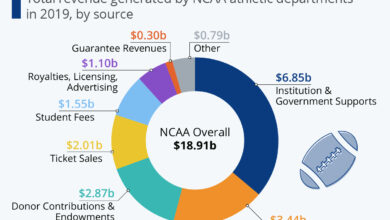Best Scholarships For International Students In 2025: Empowering Global Education
Best Scholarships for International Students in 2025 sets the stage for this enthralling narrative, offering readers a glimpse into a story that is rich in detail and brimming with originality from the outset. As we dive into the world of scholarships for international students in 2025, we uncover a landscape of opportunities and innovation that is set to shape the future of education on a global scale.
Overview of Scholarships in 2025
In 2025, the landscape of scholarships for international students is evolving rapidly, with a focus on diversity, inclusivity, and accessibility. Scholarship offerings are becoming more varied, catering to a wider range of students from different backgrounds and regions.
Trends in Scholarship Offerings
- Increased Focus on Diversity: Scholarships are now being designed to promote diversity and inclusion, encouraging students from underrepresented communities to apply.
- Specialized Scholarships: More scholarships are being tailored to specific fields of study or career paths, providing targeted support to students pursuing niche areas.
- Online Application Processes: Technology has streamlined the application process for scholarships, making it easier for students to apply from anywhere in the world.
- Partnerships with Companies: Many scholarships now involve collaborations with companies, offering students opportunities for internships or job placements alongside financial support.
Impact of Technology on Scholarship Availability and Accessibility
Technology has played a significant role in making scholarships more accessible to international students. Online platforms and digital tools have simplified the application process, allowing students to search for and apply to scholarships with ease. Additionally, technology has enabled scholarship providers to reach a wider audience, making information about available scholarships more readily available to students worldwide.
Emerging Scholarship Types
In 2025, new types of scholarships are expected to take center stage, revolutionizing the way students can access financial aid for their education.
Innovative Scholarships vs. Traditional Scholarships
- Innovative scholarships may focus on specific skills or competency-based criteria rather than just academic performance.
- Traditional scholarships often require high GPAs or standardized test scores, while innovative scholarships may prioritize real-world experiences and project-based assessments.
- Criteria for innovative scholarships may include participation in hackathons, coding competitions, or community service projects.
- Technology-driven scholarships may emphasize proficiency in coding, data analytics, or other digital skills that are in high demand.
Impact of Technology on Application Process
- Technology has streamlined the application process for scholarships, making it more accessible and efficient for students worldwide.
- Online platforms and AI algorithms can match students with relevant scholarship opportunities based on their profiles and interests.
- Virtual interviews and online assessments may replace traditional in-person interviews, making the selection process more inclusive and convenient.
- Blockchain technology can enhance transparency and security in scholarship distribution, ensuring that funds reach deserving recipients.
Industry-Focused Scholarships
- Emerging fields such as artificial intelligence, sustainable energy, and biotechnology are likely to offer scholarships to students pursuing studies in these areas.
- Companies in tech hubs like Silicon Valley or biotech clusters may sponsor scholarships to attract top talent and foster innovation in their industries.
- Startups and entrepreneurial organizations may offer scholarships to students with innovative business ideas or projects with potential for social impact.
Diversity and Inclusion in Selection Process
- New scholarships may prioritize diversity and inclusion by considering factors such as socioeconomic background, geographic location, and underrepresented minority status.
- Selection committees may focus on creating a balanced cohort of scholars from different cultural, ethnic, and academic backgrounds to promote cross-cultural exchange and collaboration.
- Inclusive scholarships may provide support for students with disabilities or unique challenges, ensuring equitable access to educational opportunities.
Geographical Distribution and Access for Applicants
- New scholarship opportunities may be distributed globally, allowing students from remote or underserved regions to access funding for their education.
- Virtual scholarship fairs and online information sessions can connect international students with scholarship providers from around the world, breaking down geographical barriers.
- Regional organizations, international NGOs, and government agencies may collaborate to offer joint scholarship programs that benefit students across borders.
Sustainability and Long-Term Impact
- Innovative scholarships that focus on skills relevant to the future job market can have a long-term impact on the education sector by preparing students for emerging careers.
- Sustainable scholarships that support students throughout their academic journey, including mentorship and career guidance, can contribute to higher retention rates and graduation success.
- Partnerships between educational institutions, industry stakeholders, and philanthropic organizations can ensure the sustainability of scholarship programs and their positive impact on society.
Top Countries Offering Scholarships
When it comes to providing the best scholarships for international students in 2025, there are several countries that stand out for their generosity and support. These countries are known for their high-quality education systems and commitment to attracting top talent from around the world.
United States
The United States is a popular destination for international students seeking scholarships due to its world-renowned universities and diverse range of programs. Scholarships in the U.S. are often merit-based, need-based, or offered through specific institutions or organizations. The application process varies depending on the scholarship, but it typically involves submitting academic records, recommendation letters, and essays.
United Kingdom
The United Kingdom is another top country offering scholarships to international students, with institutions like Oxford and Cambridge leading the way in academic excellence. Scholarships in the UK can cover tuition fees, living expenses, or both, and are available for undergraduate, postgraduate, and research programs. Eligibility criteria may include academic achievement, leadership skills, and community involvement.
Australia
Australia is known for its welcoming environment and high standard of education, making it a popular choice for international students looking for scholarships. Scholarships in Australia can be funded by the government, universities, or private organizations, and may cover tuition, accommodation, and travel expenses. Application requirements typically include academic transcripts, English language proficiency tests, and a statement of purpose.
Canada
Canada offers a range of scholarships to international students, with institutions like the University of Toronto and McGill University attracting top talent from around the world. Scholarships in Canada can be based on academic merit, financial need, or specific fields of study. Applicants may need to provide letters of recommendation, personal statements, and evidence of extracurricular activities.
Germany
Germany is known for its tuition-free education at public universities, making it an attractive option for international students seeking scholarships. Scholarships in Germany can be offered by the government, universities, or private organizations, and may cover living expenses, health insurance, and travel costs. Eligibility criteria often include academic excellence, language proficiency, and a strong research proposal.
Fields of Study with Most Funding
As we look ahead to 2025, it is crucial to identify the academic fields that are likely to receive the most scholarship funding. These fields play a significant role in shaping the future and impacting the career opportunities of international students.
Importance of STEM Fields
STEM (Science, Technology, Engineering, and Mathematics) fields are expected to continue receiving substantial scholarship funding in 2025. These disciplines are crucial for advancements in technology, innovation, and scientific research, making them highly relevant in today’s rapidly evolving world.
- STEM fields drive technological innovation and contribute to economic growth.
- Scholarships in STEM fields attract top talent from around the world, fostering global collaboration and knowledge exchange.
- Career opportunities in STEM fields are diverse and offer competitive salaries and job stability.
Funding Allocation: STEM vs. Liberal Arts and Social Sciences
While STEM fields typically receive a significant portion of scholarship funds, there is also a growing recognition of the importance of liberal arts and social sciences. These disciplines provide valuable perspectives on societal issues, cultural understanding, and critical thinking skills.
- Liberal arts and social sciences contribute to a well-rounded education and foster creativity and empathy.
- Scholarships in these fields help support diverse voices and perspectives in academia and research.
- Combining STEM with liberal arts or social sciences can lead to holistic solutions to complex global challenges.
Geographical Distribution of Scholarship Funds
The distribution of scholarship funds across different regions can influence educational priorities and research focus areas. Countries and organizations may prioritize certain fields based on regional needs and strategic goals.
- Developed countries often allocate more funds to STEM fields to maintain their technological edge and drive innovation.
- Emerging economies may focus on a mix of STEM and social sciences to address local challenges and promote sustainable development.
- Collaborative scholarship programs between countries can lead to cross-disciplinary research and knowledge sharing.
Diversity and Inclusion in Scholarships
Diversity and inclusion in scholarships are crucial for providing equal opportunities to all students, regardless of their background. By prioritizing diversity, scholarship programs can positively impact underrepresented groups and create a more inclusive educational environment.
Scholarship Programs Promoting Diversity and Inclusion
- The Gates Scholarship: This program aims to support outstanding minority students with high financial need.
- Fulbright Program: Offers scholarships to students from diverse backgrounds to study, teach, or conduct research abroad.
- UNCF Scholarships: Focuses on providing financial assistance to African American students and other minority groups.
Impact of Initiatives on Underrepresented Groups
Scholarship programs that prioritize diversity and inclusion have positively impacted underrepresented groups by breaking down barriers to access higher education. These initiatives have helped students from marginalized communities achieve their academic and career goals.
Effectiveness of Mentorship Programs
Mentorship programs play a crucial role in supporting diverse scholarship recipients by providing guidance, resources, and networking opportunities. They help students navigate academic challenges and build professional connections.
Comparison of Selection Criteria
Traditional scholarship programs often focus on academic merit and extracurricular achievements. In contrast, programs designed to promote inclusivity may consider factors like socioeconomic background, cultural diversity, and leadership potential in their selection criteria.
Types of Scholarships for Diverse Groups
| Scholarship Type | Eligibility Requirements |
|---|---|
| Women in STEM Scholarship | Female students pursuing degrees in STEM fields |
| LGBTQ+ Scholarships | Open to LGBTQ+ students who demonstrate academic excellence |
| First-Generation Scholarships | Available to students who are the first in their families to attend college |
Role of Alumni Networks
Alumni networks play a vital role in providing support and opportunities for diverse scholarship recipients. They can offer mentorship, career guidance, and networking connections to help students succeed beyond their academic pursuits.
Scholarship Application Processes
When it comes to applying for scholarships in 2025, international students need to navigate through a series of steps to increase their chances of securing funding for their studies. Understanding the typical application process and knowing how to stand out from other applicants is crucial in this competitive landscape.
Typical Steps Involved in Applying for Scholarships
Applying for scholarships usually involves the following steps:
- Research: Look for scholarship opportunities that match your eligibility criteria and academic pursuits.
- Prepare Documents: Gather necessary documents such as transcripts, recommendation letters, and essays.
- Submit Applications: Complete and submit applications before the deadlines.
- Interviews: Some scholarships may require an interview as part of the selection process.
- Wait for Results: Be patient and await notifications regarding the outcome of your application.
Tips for International Students to Improve Their Chances
International students can enhance their chances of securing scholarships by:
- Starting Early: Begin researching and preparing well in advance of application deadlines.
- Customizing Applications: Tailor your applications to highlight your unique strengths and experiences.
- Seeking Feedback: Have mentors or advisors review your application materials for feedback.
- Applying to Multiple Scholarships: Increase your chances by applying to a variety of scholarships.
- Being Persistent: Don’t get discouraged by rejections; keep applying to new opportunities.
Comparison of Application Processes of Different Scholarship Providers
While the general steps for applying for scholarships remain similar, different scholarship providers may have specific requirements or additional components in their application processes. Some may focus more on academic achievements, while others prioritize community involvement or leadership skills. It is essential for international students to carefully review and understand the application guidelines of each scholarship provider to tailor their applications accordingly.
Scholarships for Underrepresented Groups
Providing scholarships specifically tailored for underrepresented groups in 2025 is crucial in promoting diversity and inclusion in education. These targeted programs aim to address the disparities in access to higher education and create opportunities for students from marginalized backgrounds.
Importance of Supporting Diversity Through Targeted Scholarship Programs
Targeted scholarship programs play a vital role in breaking down barriers and fostering a more inclusive academic environment. By offering financial support and resources to underrepresented groups, these scholarships help bridge the gap in educational opportunities and promote equality.
- Increased Representation: Scholarships for underrepresented groups help increase diversity in academic settings, leading to a richer learning experience for all students.
- Empowerment and Support: By providing financial assistance and mentorship, these programs empower students from marginalized communities to pursue their academic goals with confidence.
- Breaking Stereotypes: Targeted scholarships challenge stereotypes and biases by showcasing the talent and potential of students from diverse backgrounds.
Outcomes of Providing Opportunities for Underrepresented Students
Offering scholarships to underrepresented students can have a transformative impact on their lives and the broader academic community. These opportunities not only benefit the recipients but also contribute to a more inclusive and equitable society.
- Higher Graduation Rates: Research has shown that students who receive targeted scholarships are more likely to complete their degrees and pursue further education or career opportunities.
- Career Advancement: By supporting underrepresented students in their academic journey, scholarship programs help pave the way for career success and upward mobility.
- Community Engagement: Scholarships for underrepresented groups foster a sense of belonging and community among students, creating a supportive network for future endeavors.
Impact of Economic Factors on Scholarships
When it comes to scholarships for international students in 2025, economic factors play a crucial role in determining the availability and accessibility of these opportunities. The financial status of a country, global economic trends, and individual financial capabilities all influence the scholarship landscape.
Role of Scholarships in Mitigating Financial Barriers
Scholarships serve as a vital tool in mitigating financial barriers for international students who aspire to pursue higher education abroad. By providing financial support, scholarships enable talented individuals from diverse economic backgrounds to access quality education opportunities that would otherwise be out of reach.
Strategies for Equitable Distribution of Scholarship Funds
- Implementing need-based criteria: By prioritizing students with demonstrated financial need, scholarship programs can ensure that funds are allocated to those who require the most assistance.
- Establishing partnerships with donors: Collaborating with donors and organizations committed to promoting education equity can expand the pool of available funds and reach a more diverse group of students.
- Transparency in selection processes: Maintaining transparency in scholarship selection processes, criteria, and fund allocation can help build trust among applicants and stakeholders, ensuring that funds are distributed fairly.
- Monitoring and evaluation: Regular monitoring and evaluation of scholarship programs can identify any disparities in fund distribution and effectiveness, allowing for adjustments to be made to promote equitable access.
Scholarships and Career Development
Scholarships play a crucial role in shaping the long-term career prospects of international students by providing them with opportunities for skill development, enhancing their employability, and influencing their career trajectories.
Connection Between Scholarships and Career Development
Receiving scholarships can significantly impact the career development of international students. By providing financial support for education, scholarships enable students to focus on their studies without the burden of excessive student loan debt. This allows them to pursue additional learning opportunities, internships, and networking events that can enhance their skills and knowledge in their field of study.
Contribution to Skill Development and Employability
- Scholarships often come with specific requirements or expectations, such as maintaining a certain GPA or participating in extracurricular activities. These conditions can motivate students to excel academically and develop important soft skills like time management, teamwork, and communication.
- Furthermore, scholarships may offer recipients the chance to engage in research projects, attend conferences, or undertake study abroad programs, all of which contribute to their overall skill development and employability.
Impact on Students’ Career Trajectories
Receiving scholarships can open doors to prestigious job opportunities, as employers value candidates who have demonstrated academic excellence, leadership qualities, and a commitment to their field of study.
Moreover, the networks and connections that students build during their scholarship programs can play a significant role in shaping their career trajectories, as they may receive mentorship, guidance, and job referrals from alumni or industry professionals.
Sustainability and Environmental Scholarships
In 2025, there has been a significant rise in sustainability-focused scholarships, reflecting the growing importance of environmental initiatives in scholarship programs. International students play a crucial role in driving sustainable practices through these scholarships, contributing to a more environmentally conscious and responsible academic community.
Importance of Sustainability in Scholarship Programs
Sustainability-focused scholarships are designed to support students who are dedicated to making a positive impact on the environment through their academic pursuits. These scholarships not only encourage students to engage in sustainable practices but also promote research and innovation in fields related to environmental conservation and climate change.
Role of International Students in Promoting Sustainability
International students bring diverse perspectives and experiences to the table, enriching discussions on sustainability and environmental conservation within scholarship programs. By participating in these initiatives, international students can collaborate with their peers from around the world to develop innovative solutions to global environmental challenges.
Scholarships for Research and Innovation
Research and innovation are crucial components of academic and technological advancement, driving progress in various fields. Scholarships that target research and innovation play a significant role in supporting international students pursuing these endeavors, fostering creativity, and pushing the boundaries of knowledge. Investing in research-oriented scholarships not only provides financial assistance but also nurtures talent and encourages groundbreaking discoveries that can have a lasting impact on society.
Examples of Research and Innovation Scholarships
- The Fulbright Program: A prestigious scholarship that supports research projects in a wide range of disciplines, promoting cultural exchange and collaboration.
- The Rhodes Scholarship: Known for its focus on leadership and academic excellence, it also offers opportunities for research in various fields.
- The DAAD Scholarship: Provides funding for international students to conduct research in Germany, fostering academic partnerships and innovation.
Application Process for Research-Focused Scholarships
- Identify the scholarship programs that align with your research interests and goals.
- Prepare a strong research proposal outlining your project objectives, methodology, and expected outcomes.
- Obtain letters of recommendation from professors or experts in your field of study.
- Submit all required documents, including academic transcripts and proof of language proficiency, by the specified deadline.
- Prepare for interviews or additional assessments that may be part of the selection process.
Benefits of Research Scholarships
- Opportunity to work on cutting-edge research projects and contribute to scientific advancements.
- Access to state-of-the-art facilities, resources, and mentorship from renowned experts in the field.
- Enhanced academic and professional development through hands-on research experience and networking opportunities.
Long-Term Effects of Research Scholarships
- Establishment of a strong research profile that can open doors to future academic and career opportunities.
- Contribution to the body of knowledge in your field, potentially leading to publications, patents, or innovations.
- Recognition as a thought leader and expert in your research area, creating a lasting impact on your academic and professional reputation.
Scholarships for Community Engagement
Community engagement scholarships are designed to recognize and support students who are actively involved in making a positive impact on their communities. These scholarships go beyond academic achievements and focus on the social responsibility and leadership potential of students.
Criteria for Selecting Recipients
- Commitment to community service: Organizations look for candidates who have demonstrated a consistent and meaningful involvement in community projects.
- Leadership skills: Recipients are often expected to show leadership qualities and the ability to inspire others to participate in community service initiatives.
- Impact on the community: Applicants are evaluated based on the tangible outcomes of their community engagement efforts and the positive changes they have brought about.
Effective Showcase of Community Service Experience
- Provide detailed descriptions: When describing community service activities, applicants should emphasize the specific roles they played, the challenges they encountered, and the results achieved.
- Quantify impact: It is important to quantify the impact of community projects by including data on the number of beneficiaries, funds raised, or measurable improvements in the community.
- Letters of recommendation: Including letters from community leaders or project beneficiaries can provide additional validation of the applicant’s contributions.
Long-Term Effects of Community Engagement Scholarships
Community engagement scholarships not only provide financial support for students but also help them develop important skills such as communication, teamwork, and problem-solving. Recipients of these scholarships often continue their community involvement beyond their academic years, becoming advocates for social change and contributing to the sustainable development of their communities.
Technology and Scholarship Management
Technology plays a crucial role in revolutionizing the management of scholarship programs, offering innovative solutions to streamline processes and improve efficiency. Let’s explore the various aspects of how technology is reshaping scholarship administration.
Use of AI and Data Analytics
AI and data analytics are increasingly being utilized to optimize scholarship processes. By analyzing vast amounts of data, institutions can identify trends, make data-driven decisions, and enhance the overall scholarship experience for applicants and administrators.
Benefits and Challenges of Integrating Technology
The integration of technology in scholarship administration brings numerous benefits such as improved accessibility, enhanced efficiency, and reduced administrative burden. However, challenges like data privacy concerns and the digital divide need to be addressed to ensure equitable access to scholarship opportunities.
Impact of Cloud Computing
Cloud computing has revolutionized the accessibility and efficiency of scholarship management systems. It allows for seamless collaboration, secure data storage, and remote access to scholarship information, benefiting both applicants and administrators.
Role of Blockchain Technology
Blockchain technology ensures transparency and security in scholarship fund distribution by creating an immutable ledger of transactions. This technology can prevent fraud, enhance accountability, and build trust among stakeholders involved in scholarship programs.
Traditional vs. Online Scholarship Application Methods
Comparing traditional scholarship application methods with online platforms reveals advantages such as increased reach, faster processing, and reduced paperwork. However, challenges like digital literacy and internet access disparities must be considered to ensure inclusivity.
Ethical Considerations in AI Selection
The use of AI in selecting scholarship recipients raises ethical considerations related to bias, fairness, and transparency. Institutions must implement safeguards and transparency measures to mitigate algorithmic bias and ensure a fair selection process.
Strategies for Mobile Applications in Scholarship Tracking
Universities can implement mobile applications to enhance scholarship tracking and communication with applicants. These apps can provide real-time updates, personalized notifications, and a user-friendly interface to improve the overall scholarship experience.
Potential of Virtual Reality Technology
Virtual reality technology has the potential to create immersive scholarship awareness campaigns for students, offering interactive experiences and engaging storytelling to showcase scholarship opportunities in a compelling way.
Evolution of Technology in Scholarship Management
A timeline detailing key milestones in the evolution of technology in scholarship management showcases the progression from manual processes to digital solutions, highlighting the transformative impact of technology on scholarship administration.
Scholarships and Global Education Trends
Scholarships play a crucial role in the ever-evolving landscape of global education by aligning with emerging trends, shaping the future of international education, and adapting to changing educational paradigms.
The Impact of Scholarship Opportunities
Scholarships have a profound impact on shaping the future of international education by providing opportunities for students from diverse backgrounds to access quality education. As global education trends continue to evolve, scholarships help bridge the gap between financial barriers and educational advancement.
Alignment with Changing Educational Paradigms
With the changing landscape of education, scholarships are adapting to align with new educational paradigms such as online learning, hybrid models, and skill-based education. Scholarships are not only offering financial support but also focusing on promoting innovation, technology integration, and interdisciplinary studies.
Enhancing Global Competitiveness
Scholarships contribute to enhancing global competitiveness by attracting top talent from around the world. As countries and institutions compete to attract the best students, scholarships play a crucial role in not only empowering individuals but also enriching the educational environment with diverse perspectives and ideas.
Concluding Remarks
In conclusion, Best Scholarships for International Students in 2025 highlights the transformative power of education through scholarships, paving the way for a brighter and more inclusive future for aspiring students worldwide. As we look ahead to 2025, the realm of scholarships presents a promising horizon filled with possibilities and growth for those seeking knowledge and excellence.









